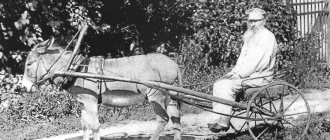About the product
The story “Lady Macbeth of Mtsensk” by Leskov was written in 1864 and published in January of the following year in the literary magazine “Epoch”. According to the writer’s idea, the story was to lead a cycle dedicated to the characters of Russian women. However, Leskov’s plans were not destined to come true due to the closure of “Epoch”.
We recommend reading online a summary of “Lady Macbeth of Mtsensk” chapter by chapter. A brief retelling of the book will be useful for the reading diary and in preparation for literature lessons.
The material was prepared jointly with a teacher of the highest category, Kuchmina Nadezhda Vladimirovna.
Experience as a teacher of Russian language and literature - 27 years.
Summary
Chapter first
Katerina Lvovna Izmailova, although “was not born a beauty,” had a pleasant appearance. Her husband was a merchant from the Kursk province, whom she married not for love, but because she was poor and “she didn’t have to go through suitors.”
Katerina Lvovna lived in a rich merchant’s house with her husband, Zinovy Borisovich, who was “more than fifty years old,” and with his father, Boris Timofeevich. The Izmailov couple had no children, and this fact upset them very much.
Chapter two
Once a mill dam that belonged to the Izmailov merchants broke. Zinovy Borisovich went to solve this problem, and Katerina Lvovna “toiled at home all day long, alone.”
During the walk, Katerina joined the company of cheerful clerks, and for fun, she measured her strength with the handsome young servant Sergei.
In the meantime, the cook told the hostess that the handsome Sergei, without a twinge of conscience, “would seduce any woman and bring her to sin.”
Chapter Three
On a fine evening, Katerina Lvovna is bored alone: her husband stayed late at the mill, and her father-in-law went to his name day. Unexpectedly, Sergei comes to see her under a plausible pretext. His passionate declarations of love make the young woman dizzy. Sergei is not at a loss and takes her to the bedroom.
Chapter Four
All week, while Zinovy Borisovich was not at home, his wife walked with the handsome Sergei until the morning. But one day the father-in-law, suffering from insomnia, noticed the servant climbing out of the window. Boris Timofeevich whipped his shameless lover, and he himself sent people for his son.
Katerina Lvovna begged the old man to let Sergei go, but he firmly decided to punish the traitor and send her lover to prison.
Chapter Five
But it was in vain that old man Izmailov did not listen to his daughter-in-law. Having eaten “mushrooms with gruel at night,” by morning he died in terrible agony, “just as the rats died in his barns.”
Katerina freed her lover and, laying him on her husband’s bed, began to look after him.
Meanwhile, Zinovy Borisovich went a hundred miles away to buy timber, without learning about the domestic tragedy. Without waiting for him, by order of the hostess they hastily “buried Boris Timofeich.”
Katerina Lvovna was a “woman of the timid ten” - she became so insolent that she openly demonstrated her connection with Sergei.
Chapter Six
Katerina is overcome by a midday sleep, and she dreams of a “nice, gray, tall and overweight, fat” cat that rubs itself between her and Sergei. The woman unsuccessfully tries to drive away the uninvited guest, who “like fog passes right past her fingers.”
Katerina extracts declarations of love from Sergei, but he is not at all cheerful: the owner will soon return and then the end of their love joys will come. The smart guy hints that he is ready to marry her, and, intoxicated by his sweet words, the woman decides to settle the problem with her husband.
Chapter Seven
Katerina again dreams of “the old cat,” but only this time his head is not an ordinary cat’s, but his late father-in-law’s. He fawns over the woman and reproaches her for her difficult death.
Katerina lies “with her eyes open and suddenly hears” someone making noise in the yard. She understands: her old unloved husband has returned. Sergei quickly left the bedchamber and hid under the window.
Zinovy Borisovich enters, who already knows everything about the adventures of his unfaithful wife. However, his fair accusations only provoke Katerina. She calls Sergei and kisses him passionately in front of her husband. Zinovy Borisovich cannot stand it and gives her a strong slap in the face.
Chapter Eight
Katerina rushes at her husband and pushes him to the floor with all her might. Zinovy Borisovich understands that his wife “decided to do anything just to get rid of him.”
The lovers kill the merchant and take his body to the cellar. Having destroyed traces of the crime, Katerina turns to Sergei: “Well, now you are a merchant.”
Chapter Nine
The neighbors just can’t figure out where Zinovy Borisovich has gone. The search for the merchant began, but they did not yield anything: “the merchant disappeared into the water.”
A few months later, Katerina felt that she was pregnant. She managed to transfer all the affairs into her own name and personally take charge of running a large household.
Unexpectedly, Katerina Lvovna learned that most of the capital of her late husband belonged to his little nephew Feda. And a week after the news, “an old woman with a little boy” came to stay with her.
Chapter Ten
Fedya gets chickenpox. He is looked after alternately by his grandmother and Katerina. Looking at Fedya, she is surprised at “how much harm this boy causes her and how good it would be if he were not there.”
When the grandmother goes to church for an all-night vigil, and the sick Fedya is left alone, the lovers decide to take advantage of the opportunity.
Chapter Eleven
Sergei held the arms and legs of the unfortunate boy, while Katerina Lvovna “in one movement covered the child’s face” with a large pillow and leaned on it with her whole body. A few minutes later, “grave silence” reigned in the room.
Frightened Sergei began to run, but then terrible blows were heard on the windows. With a firm hand, Katerina opened “the doors into which a bunch of people were breaking.”
Chapter Twelve
People returning from service discussed the merchant's wife Izmailova and her love affair with Sergei. Everyone came to the same opinion: Katerina was so “disappointed that she is not afraid of God, or conscience, or human eyes.”
Walking past the Izmailovo house and seeing a light in the window, they decided to see what was going on there. At this moment, the curious became unwitting witnesses to the murder of a child.
During the investigation, Katerina Lvovna denied everything, while Sergei “burst into tears and sincerely confessed” to all the murders he had committed. At the trial, the criminals were sentenced: “to be punished with whips in the marketplace of their city and then to send both of them to hard labor.” In due time, Katerina gave birth to a child “in a prison hospital”, which she immediately abandoned.
Chapter Thirteen
Katerina Lvovna’s child was given to be raised by an old woman who had previously babysat Fedya. He became “the only heir to the entire Izmailovo fortune.”
Katerina easily parted with the baby: all her thoughts were occupied with Sergei, whom she hoped to see on the way to hard labor. She gave all her money to the guards so that she could see her lover occasionally. During this time, Sergei changed a lot and reacted with irritation to Katerina’s caresses.
Another one joined the party that included the lovers. Two women especially stood out in her: the loving and unpretentious beautiful soldier Fiona, and the young pretty blonde Sonetka, who “had taste and choice” in love affairs.
Chapter fourteen
Sergei liked the “languid beauty Fiona”, and he quickly managed to win her affection. One day Katerina found her lover with Fiona. After the humiliation she suffered, she tried to inspire herself with disgust for the insidious traitor, but to no avail.
While Katerina was angry with Sergei, he “began to act up and flirt with little white Sonetka.” Noticing his flirting, Katerina decided to forget about her pride and make peace with her lover.
Sergei, pretending to be sick, asked Katerina to get him woolen stockings. Fearing for his health, she gave him her only warm stockings.
Chapter fifteen
In the morning Katerina saw Sonetka in the “blue woolen stockings” that she knew well. Unable to bear such humiliation, she walked up to Sergei and spat in his face. That same night, two prisoners counted out fifty lashes to Katerina: this was Sergei’s revenge, which continued in the following days: he openly kissed Sonetka, joked and openly insulted his former mistress.
During the ferry crossing, Katerina peered intently into the waves, and images of the souls she had destroyed flashed before her eyes. Suddenly she “grabbed Sonetka by the legs and in one fell swoop threw her over the side of the ferry.” After a couple of moments, both rivals disappeared from sight.
Lady Macbeth of Mtsensk
Lev Nikolaevich Tolstoy
Watchmaker
What does a watchmaker do when assembling watches, if he is a master and definitely knows how to make watches? All his fingers are busy: some hold the wheel, others position the axle, others move the gear. He does all this with gentleness, with tenderness. He knows that not only if he rudely shoves one into the other, if even a little clumsily puts one part on, forgetting the other, then everything will fall apart, and it is better for him not to do this thing if he cannot give all his strength. This is why I say this. At first, people live without knowing why, they live only for their own pleasure, which replaces the question for them: “why?” But then the time comes for every intelligent being, he asks: “why?” and receives that answer from Christ that we all know: “to do God’s work.” Is God's work really either less important or less complicated than a watch? Is it really possible to do God’s work head on and everything will work out? In a watch you cannot press on the wrong part, but the defenders of worldly life say: “What is there to disassemble, does not fit into the place, hit it hard with a hammer, it will go right in.” They don't care that everything else gets flattened. They don't even see it. You cannot work on a watch without full attention and, so to speak, love for all parts. Is it really possible to work God’s work like this? It is good to do the work of God from the shoulder (that is, to live not in love with brothers) for someone who does not quite believe that his work is the work of God. But when a person believes that the meaning of his life is only to promote the unification of people, then he cannot help but devote himself entirely to the one whose work he is doing; he can no longer treat all the people with whom he comes into contact without care, attention and love. , because all people are wheels, gears, pins of God’s work. The only difference between a man and a watchmaker is that the watchmaker knows what will come out of all the parts, but a man, doing God’s work, does not know, does not see the external side of the matter. A person is rather an apprentice who supplies, cleans, lubricates and partly connects the components of a watch unknown to him in form, but known to him in essence (good). I want to say that a person who believes that life is the fulfillment of God’s work must develop seriousness, attentiveness, caution in relations with people, such attentiveness in which creaking, violence, breaking are impossible, and everything will always be soft and loving not for his own pleasure, but because this is the only condition under which God’s work is possible. If this condition is not there, then one of two things: either develop this condition, or give up God’s work and not deceive either yourself or others. Just as a watchmaker stops working as soon as he scratches and creaks, so a believer must stop as soon as there is an unloving attitude towards a person, and he must know that, no matter how unimportant this person may seem to him, what is more important is the relationship with this person, while it creaks, there is nothing. And this is so, because man is a necessary wheel in the work of God, and until he enters where he should enter, lovingly, the whole matter has become. Communication between people obliges them to find both in each of them and in themselves the “son of man,” to unite in him, to arouse both in themselves and in him the desire for rapprochement, that is, love. They will say: it is difficult to find this. Just act like a watchmaker: gently, carefully, not for yourself, but for the cause, and it will come by itself. Disconnection occurs only because I want to force the axle into the wrong wheel. If it doesn’t fit one way or another, correct yourself: there is a place for it, it is needed and will come into play. Just as when working on a watch you achieve your goal and master the task not through exertion of strength, but through caution and gentle handling, the same is true in dealing with people. And not exactly the same, but as many times more, how many times a person is more complex and gentle than a clock. It is impossible to develop tentacles long enough to handle people with them. And the longer and therefore thinner these tentacles are, the more powerfully they move people.






